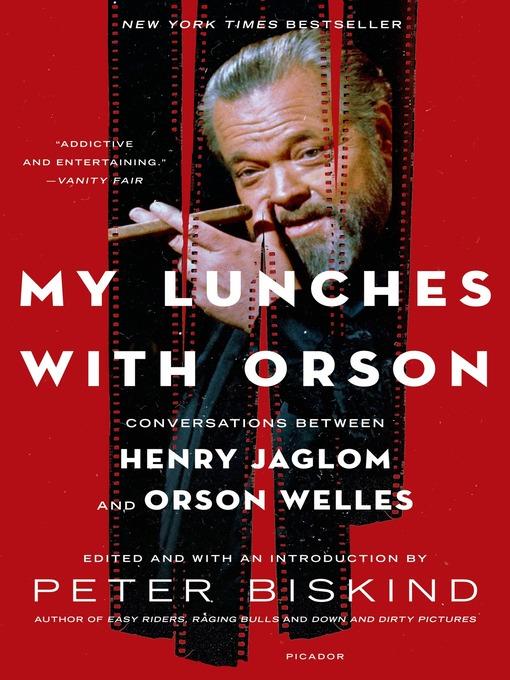
My Lunches with Orson
Conversations between Henry Jaglom and Orson Welles
کتاب های مرتبط
- اطلاعات
- نقد و بررسی
- دیدگاه کاربران
نقد و بررسی

May 15, 2013
Tape recordings made in the three years before Orson Welles' death in 1985 capture the legendary film director's outsized personality. As editor Biskind (Star: How Warren Beatty Seduced America, 2010, etc.) explains in his introduction, Henry Jaglom talked Welles into acting in his first feature, A Safe Place, in 1971, and they became friends. Jaglom's generation worshipped the creator of Citizen Kane as a groundbreaking auteur who pioneered their sort of personal filmmaking; Welles liked to be worshipped. By the time Jaglom began recording their conversations over lunches at Ma Maison, Welles hadn't made a movie in 10 years, and F Is for Fake (1974) had flopped. Aided by Jaglom, he was trying to get financing for a film version of King Lear or his political script, The Big Brass Ring. But nothing came through, and Welles' income from TV commercials had also dried up; his reputation was at a low point. In conversation, Welles shows himself eager to disprove his critics, as well as to savagely gossip about his bitterly estranged theatrical partner, John Houseman, and to comment unflatteringly on the talents of friends/rivals, from Laurence Oliver and John Huston to Marlon Brando and Peter Bogdanovich. Jaglom, an admirer but not a sycophant, occasionally protests such judgments, but he's unfailingly supportive of a friend they both know is in the twilight of his career. Welles could be mean-spirited and insufferable, but he was also blazingly intelligent. His nailing of Woody Allen and Charlie Chaplin as sharing "that particular combination of arrogance and timidity [that] sets my teeth on edge" is characteristic of his sharp wit about every aspect of moviemaking, and he's just as smart about history, music and fine art. You can understand why his friends were so devoted. Like most oral histories, a tad self-indulgent but filled with insights and good dish that movie buffs will relish.
COPYRIGHT(2013) Kirkus Reviews, ALL RIGHTS RESERVED.

June 1, 2013
When his first film, Citizen Kane, was released, Welles had already achieved fame in theater and radio. He followed Kane with several masterpieces, including The Magnificent Ambersons (1942) and Touch of Evil (1958) and was famous as Harry Lime in The Third Man (1949). By the 1980s, his films already classics, he hadn't made a new film in nearly a decade, making it impossible to get funding for future projects, which led to lending his voice to wine commercials. Dining frequently with filmmaker Henry Jaglom, Welles allowed him to record their conversations. These recordings reveal Welles, the raconteur, as he recalls lovers (Rita Hayworth, Lena Horne); disses actors and directors (John Houseman, Joan Fontaine, Chaplin); tells outlandish stories (Carole Lombard's plane was shot down by Nazi agents in America); and bemoans lack of respect from his peers. He is unguarded in his comments, revealing a vain, prickly personality, uncompromising and brilliant. Film buffs will find Welles' commentary endlessly fascinating, though the director's fans might be saddened to see him as a washed-up has-been. A worthy addition to the Bogdanovich, Leaming, and Callow accounts of Welles.(Reprinted with permission of Booklist, copyright 2013, American Library Association.)

February 1, 2013
Back when, the inimitable Orson Welles recorded a series of private conversations while lunching with director Henry Jaglom, a good friend. In the recently rescued tapes, here edited by film historian Biskind, Welles offers a montage of opinion on his career, his disappointments, and acquaintances from Marlene Dietrich and Laurence Olivier to Winston Churchill. Don't expect polite, but the wit and intelligence are definitely there.
Copyright 2013 Library Journal, LLC Used with permission.

July 1, 2013
Toward the end of his life, Orson Welles (1915-85) enjoyed an unlikely friendship with independent filmmaker Henry Jaglom. Editor Biskind (Down and Dirty Pictures: Miramax, Sundance, and the Rise of Independent Film) collects long-lost tapes of Welles and Jaglom's conversations over lunch at Hollywood's Ma Maison restaurant. The wide-ranging talks cover Welles's reflections on food, politics, religion, and his many unrealized projects. The book clearly reflects the man's wit, disdain for the Hollywood studio system, and what one admirer called his "crushing ego." Among the many Hollywood legends Welles disparages here are Charlie Chaplin, Elia Kazan, Spencer Tracy, Irene Dunne, Laurence Olivier, Alfred Hitchcock, Humphrey Bogart, actor-producer John Houseman, and MGM producer Irving Thalberg and his wife, actress Norma Shearer. Some of the people Welles admires include his frequent costar Joseph Cotten, Carole Lombard, Erich von Stroheim, Buster Keaton, and Welles's ex-wife Rita Hayworth. VERDICT Some readers will be put off by Welles's sharp-tongued remarks on gays, Jews, and certain ethnic groups, particularly Irish Americans, and his negative view of many Hollywood icons. However, on balance, this is an entertaining, revealing look at a Hollywood legend. Recommended.--Stephen Rees, formerly with Levittown Lib., PA
Copyright 2013 Library Journal, LLC Used with permission.

























دیدگاه کاربران